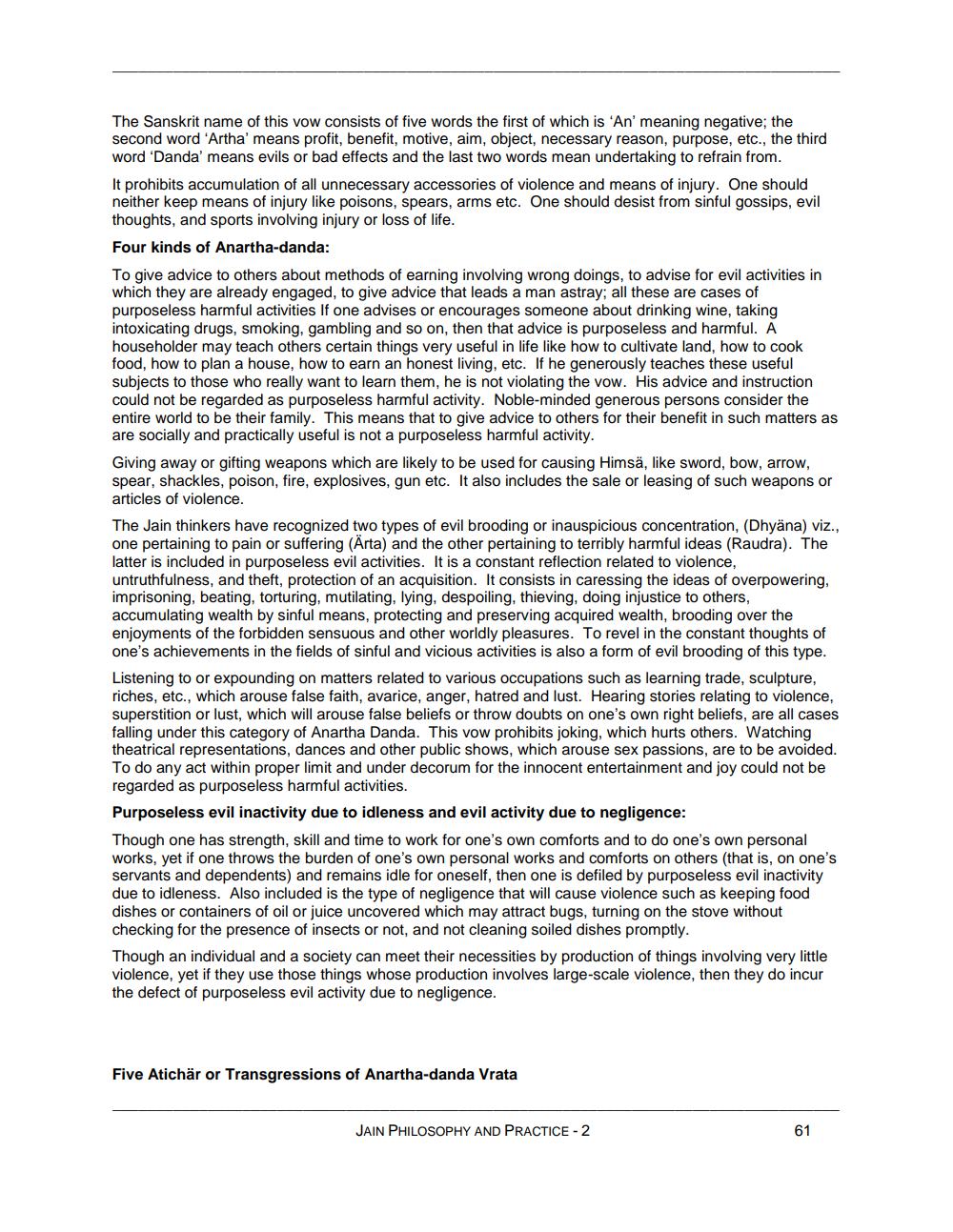________________
The Sanskrit name of this vow consists of five words the first of which is 'An' meaning negative; the second word 'Artha' means profit, benefit, motive, aim, object, necessary reason, purpose, etc., the third word 'Danda' means evils or bad effects and the last two words mean undertaking to refrain from.
It prohibits accumulation of all unnecessary accessories of violence and means of injury. One should neither keep means of injury like poisons, spears, arms etc. One should desist from sinful gossips, evil thoughts, and sports involving injury or loss of life.
Four kinds of Anartha-danda:
To give advice to others about methods of earning involving wrong doings, to advise for evil activities in which they are already engaged, to give advice that leads a man astray; all these are cases of purposeless harmful activities If one advises or encourages someone about drinking wine, taking intoxicating drugs, smoking, gambling and so on, then that advice is purposeless and harmful. A householder may teach others certain things very useful in life like how to cultivate land, how to cook food, how to plan a house, how to earn an honest living, etc. If he generously teaches these useful subjects to those who really want to learn them, he is not violating the vow. His advice and instruction could not be regarded as purposeless harmful activity. Noble-minded generous persons consider the entire world to be their family. This means that to give advice to others for their benefit in such matters as are socially and practically useful is not a purposeless harmful activity.
Giving away or gifting weapons which are likely to be used for causing Himsä, like sword, bow, arrow, spear, shackles, poison, fire, explosives, gun etc. It also includes the sale or leasing of such weapons or articles of violence.
The Jain thinkers have recognized two types of evil brooding or inauspicious concentration, (Dhyana) viz., one pertaining to pain or suffering (Ärta) and the other pertaining to terribly harmful ideas (Raudra). The latter is included in purposeless evil activities. It is a constant reflection related to violence, untruthfulness, and theft, protection of an acquisition. It consists in caressing the ideas of overpowering, imprisoning, beating, torturing, mutilating, lying, despoiling, thieving, doing injustice to others, accumulating wealth by sinful means, protecting and preserving acquired wealth, brooding over the enjoyments of the forbidden sensuous and other worldly pleasures. To revel in the constant thoughts of one's achievements in the fields of sinful and vicious activities is also a form of evil brooding of this type. Listening to or expounding on matters related to various occupations such as learning trade, sculpture, riches, etc., which arouse false faith, avarice, anger, hatred and lust. Hearing stories relating to violence, superstition or lust, which will arouse false beliefs or throw doubts on one's own right beliefs, are all cases falling under this category of Anartha Danda. This vow prohibits joking, which hurts others. Watching theatrical representations, dances and other public shows, which arouse sex passions, are to be avoided. To do any act within proper limit and under decorum for the innocent entertainment and joy could not be regarded as purposeless harmful activities.
Purposeless evil inactivity due to idleness and evil activity due to negligence:
Though one has strength, skill and time to work for one's own comforts and to do one's own personal works, yet if one throws the burden of one's own personal works and comforts on others (that is, on one's servants and dependents) and remains idle for oneself, then one is defiled by purposeless evil inactivity due to idleness. Also included is the type of negligence that will cause violence such as keeping food dishes or containers of oil or juice uncovered which may attract bugs, turning on the stove without checking for the presence of insects or not, and not cleaning soiled dishes promptly.
Though an individual and a society can meet their necessities by production of things involving very little violence, yet if they use those things whose production involves large-scale violence, then they do incur the defect of purposeless evil activity due to negligence.
Five Atichär or Transgressions of Anartha-danda Vrata
JAIN PHILOSOPHY AND PRACTICE - 2
61




